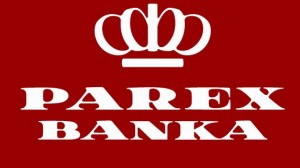RIGA — A portion of the classified Parex Bank nationalization audit report was released today, but the majority of it remains secret.
Latvia’s state auditor released its much-anticipated report on the government takeover of Parex Bank, but it contains little insight into what has become a highly contentious issue in the country.
Ingrida Sudraba, chief auditor, told the “900 Seconds” television program that two-thirds of the report contains classified information and that only one-third can be made public at this point.
She said that since acquiring Parex, the government has funneled 673 million lats (€950 million), as well as an additional 38 million lats (€53 million) in expenses. The figures, however, are not new, and similar numbers have been released by various state institutions in recent days.
Sudraba suggested that by rescuing Parex the government drained precious funds from the economy that could have been better spent on more important national projects.
The report, which was six months in the making, caps a week of torrid speculation about the legality of the Parex takeover and whether the decision, taken by the former government of Ivars Godmanis, had been the correct one.
Everyone, from President Valdis Zatlers to the bank’s former owners, have offered their opinion of the takeover, and what the government, which owns 70 percent of the bank, should do next.
But the state auditor’s report is essentially an indictment of the government’s handling of Parex’s nationalization, and has placed top officials on the defensive.
Ilmārs Rimšēvičs, president of the Bank of Latvia, attempted to preempt the report by issuing his own statement Wednesday in which he said that Latvia would have lost €3 billion — or three times what it has spent up to now — if the government had chosen not to intervene and bail out Parex.
The broad consensus in Latvian society is that the bailout was botched and that Parex’s former owners, Valery Kargin and Viktor Krasovitsky, received a sweetheart deal that pays them each nearly 200,000 lats monthly. The two men and their family members had some 63 million lats in the bank when it went belly-up, according to reports at the time.
There have been calls for a criminal investigation, but General Prosecutor Jānis Maizītis said Tuesday that hard evidence of wrongdoing was needed before his office could launch an official probe.
Meanwhile, Parex’s former owners have suggested they were prepared to take back their bank and return it to profitability. Their spokesman told the Baltic News Service that the government’s bailout plan was “flawed” and that the bank hadn’t needed 600 million lats to stay afloat. Kargin and Krasovitsky claim that when the first turned to the Finance Ministry in October 2008 they had only asked for 200 million lats in state guarantees.
The idea of allowing the two men to regain control over Parex, which prior to its fall had amassed some 16 percent of all assets in Latvia’s banking sector was immediately shot down by President Zatlers.
“One can buy the bank for the amount that the government has invested in it — or nearly 1 billion lats,” the president told reporters Wednesday evening when asked about the former owners’ proposal. “If anyone is willing to buy the bank for a billion lats, it can be done today,” Zalters said.
Prime Minister Valdis Dombrovskis and central bank chief Rimšēvičs have said that several foreign investors have expressed interest in investing in Parex, but that talks would require several months time. Parex CEO Nils Melngalis told the Baltic News Service on Wednesday that any sale of the state’s stake in the bank could take place in about a year.
The government’s chances to find a buyer increased recently after the European Bank for Reconstruction and Development purchased a 25 percent stake in Parex, a move that has helped to stem the lack of confidence in the bank’s future.
Latvia currently has 27 banks. Total losses for the sector this year are expected to exceed 1 billion lats (€1.4 billion).













